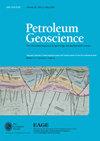Characterizing Fractured Reservoirs by Integrating Outcrop Analog Studies with Flow Simulations
IF 1.9
4区 地球科学
Q3 GEOSCIENCES, MULTIDISCIPLINARY
引用次数: 0
Abstract
This research focuses on how ‘static’ properties of fracture networks can be studied by considering ‘dynamic’ flow simulation, while static properties such as clustering, connectivity, variation in aperture and, of course, anisotropy of fracture networks can be quantified using different geostatistical/data analysis techniques. The flow responses through such networks can be simulated to check if flow simulation can be used as a tool for evaluating its geometry. In order to achieve this, outcrop analogues of fractured reservoirs are converted into permeability structured grids implementing the fracture continuum (FC) concept. These FC models are flow simulated in a streamline simulator, TRACE3D. Results of the first experiment show that rather than the ‘fractal dimension’, the ‘lacunarity parameter’, which quantifies scale-dependent clustering of fractures, is a unique identifier of network geometry and acts as a proxy for fracture connectivity and an indicator of flow behaviour. The FC model further accommodates variability in fracture apertures and, thus, in a second experiment a set of models with a hierarchical aperture distribution was built and tested for their time-of-flight (TOF) and recovery curves, which showed that smaller fractures with narrow apertures do not significantly contribute to flow. In a third experiment considering anisotropy, it was observed that tightly clustered fractures along preferential directions can be identified from anisotropy in flow patterns. The results from these three experiments show that flow patterns in fracture networks can indicate the overall scale-dependent clustering, the anisotropy that arises from such clustering and that narrower fractures do not significantly alter the overall flow behaviour. Thematic collection: This article is part of the Digitally enabled geoscience workflows: unlocking the power of our data collection available at: https://www.lyellcollection.org/topic/collections/digitally-enabled-geoscience-workflows露头模拟与流动模拟相结合的裂缝性储层表征
本研究的重点是如何通过考虑“动态”流动模拟来研究裂缝网络的“静态”特性,而静态特性,如聚类、连通性、孔径变化,当然还有裂缝网络的各向异性,可以使用不同的地质统计/数据分析技术进行量化。可以模拟通过这种网络的流动响应,以检查流动模拟是否可以用作评估其几何形状的工具。为了实现这一目标,裂缝性储层的露头模拟物被转换为渗透率结构网格,实现裂缝连续体(FC)概念。这些FC模型在流线模拟器TRACE3D中进行了流动模拟。第一个实验的结果表明,与“分形维数”不同,“空隙度参数”是一种独特的网络几何标识符,可以作为裂缝连通性的代表和流动行为的指标,而“空隙度参数”量化了裂缝的尺度相关聚类。FC模型进一步考虑了裂缝孔径的可变性,因此,在第二次实验中,建立了一组具有分层孔径分布的模型,并测试了它们的飞行时间(TOF)和采收率曲线,结果表明,较小的窄孔径裂缝对流量的贡献并不显著。在考虑各向异性的第三个实验中,观察到从流型的各向异性中可以识别出沿优先方向紧密聚集的裂缝。这三个实验的结果表明,裂缝网络中的流动模式可以表明总体上依赖于尺度的聚类,这种聚类产生的各向异性,以及较窄的裂缝不会显著改变总体流动行为。专题收集:本文是数字化地球科学工作流程的一部分:释放我们数据收集的力量:https://www.lyellcollection.org/topic/collections/digitally-enabled-geoscience-workflows
本文章由计算机程序翻译,如有差异,请以英文原文为准。
求助全文
约1分钟内获得全文
求助全文
来源期刊

Petroleum Geoscience
地学-地球科学综合
CiteScore
4.80
自引率
11.80%
发文量
28
审稿时长
>12 weeks
期刊介绍:
Petroleum Geoscience is the international journal of geoenergy and applied earth science, and is co-owned by the Geological Society of London and the European Association of Geoscientists and Engineers (EAGE).
Petroleum Geoscience transcends disciplinary boundaries and publishes a balanced mix of articles covering exploration, exploitation, appraisal, development and enhancement of sub-surface hydrocarbon resources and carbon repositories. The integration of disciplines in an applied context, whether for fluid production, carbon storage or related geoenergy applications, is a particular strength of the journal. Articles on enhancing exploration efficiency, lowering technological and environmental risk, and improving hydrocarbon recovery communicate the latest developments in sub-surface geoscience to a wide readership.
Petroleum Geoscience provides a multidisciplinary forum for those engaged in the science and technology of the rock-related sub-surface disciplines. The journal reaches some 8000 individual subscribers, and a further 1100 institutional subscriptions provide global access to readers including geologists, geophysicists, petroleum and reservoir engineers, petrophysicists and geochemists in both academia and industry. The journal aims to share knowledge of reservoir geoscience and to reflect the international nature of its development.
 求助内容:
求助内容: 应助结果提醒方式:
应助结果提醒方式:


